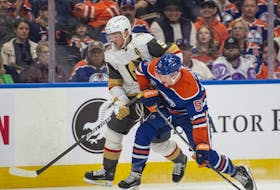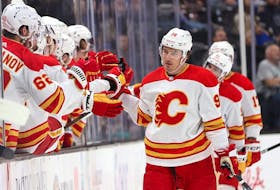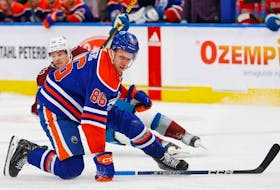CHANNEL-PORT AUX BASQUES, N.L. — It was April 3, 1989 and the Bruce Arena in Port aux Basques was packed – the Herder Cup championship was on the line.
The hometown Mariners were leading the series 3-2 against the St. John’s Capitals and the Game 6 score was deadlocked at one. Mariners captain Juan Strickland took a shot that saw the puck ricochet off one post and hit the second before Capitals goalie Dave Matte smothered it.
The fans leapt to their feet in jubilation, confident the Mariners had won while the Capitals bench immediately launched an angry protest.
“We were overhead up in the booth up there and we could see down,” recalls former Mariners President Nathan Bragg, who prefers to go by Junior. “From where we were looking it certainly looked like it went in.”
“Watching that goal go in when Juan scored, that was just amazing,” says former right winger Barry Fudge, who has a lot of fond memories from the Herder Cup win.
What winger Shawn Tobin remembers most is the fan support.
“You had to be there. That’s what stands out to me – the people, the way the town just went nuts for the game,” says Tobin, who relishes the lifelong friendships of his former teammates and rivals. “We were only kids too. We were only 18, 19 years old.”
“Every store was with a Mariners picture up in it and ‘Go Mariners Go’ and businesses and homes?” asks Bragg rhetorically. “That was awesome. The fans were just awesome.”
Former team captain and Newfoundland and Labrador Hockey Hall of Famer Juan Strickland says his favourite memories of that historic Mariners season revolve around the matchup against the Corner Brook Royals rather than the Herder Cup series.
“Obviously it was a highlight but that was the nature of the Herder,” said Strickland of his series-winning controversial goal. “But the series before that, the series that we had with the Royals – that was a seven-game series and to me, that was the playoffs. I think whoever won that series that year between us and Corner Brook was going to win the Herder. We won the Herder in six games against the Caps. It was a good series, but the series that paved the way was the Royals series. That was seven games. That was a hard series.”
Bragg says he didn’t necessarily expect the Mariners to win the Herder that year, but he did believe from the outset of the season that they were good enough to contend. He credits coach Ron Coleman and Bill Ramsey for bringing in some key players.
“Ron Coleman, being the coach, knew most of those fellows that he was contacting,” says Bragg. “They knew which ones to get.”
Getting those high-calibre players also meant bigger price tags, which is why local business backers were so crucial for the team’s success. For six months the contracted players would move to town to commit fully to the Mariners. Meanwhile most of the local skaters held down regular jobs on top of playing hockey.
“They came here and got paid,” says Tobin, who recalls getting about $75 a game. “That was their job.”
Game One of the Herder Cup almost didn’t take place at all.
The Mariners flight had been grounded in Stephenville because of heavy fog. By the time the team reached St. John’s, their executive was informed it was facing hefty fines and the loss of a home game because of Mother Nature. The Mariners pitched a protest of their own.
“They were going to penalize us,” recalls Bragg. “And they had their lawyers there and everything and I said, ‘Well, okay we’re not going on the ice.’”
The league relented, and the Mariners went on to defeat St. John’s.
“That was a bonus. I didn’t care what they’d done the next morning when we got up. We won!” chuckles Bragg.
Headley Clarke broadcasted games for the Mariners and did some unofficial scouting for them as well.
“Senior Hockey was as good as anything in Eastern Canada,” maintains Clarke. “It was the equivalent to the American Hockey League (AHL) at the time.”
Strickland agrees, and shares something the late Bob Boucher once told him.
“I knew Bob Boucher from years of playing university hockey,” said Strickland. “That year when we beat the Dartmouth (Moosehead) Mounties, he said that we would have beat most of the American Hockey League teams that year.”
In fact, the bar for senior hockey players that year was so high that the Mariners actually contemplated releasing Bill MacDougall. On Jan. 9, 1989, one day before the protected list was due to kick in, Strickland was the player representative and attended an executive meeting to debate whether or not to cut MacDougall loose by the midnight deadline.
“If he’s on our roster on January 10, we can’t release him, we can’t let him go, we gotta keep him,” recalls Strickland. “I remember saying in that meeting that anybody who’s a player by now, he’s already signed. Who are we gonna get if we release him?”
The team elected to keep MacDougall, who turned in solid performances for them throughout the post-season matchups. Only one year later MacDougall won the AHL scoring league championship, and eventually went on to play in the NHL.
“And a senior team in Newfoundland was talking about letting him go at the deadline,” chuckles Strickland at the memory. “Bill MacDougall was probably at that time sixth on our team in scoring.”
Like the others, Strickland and Clarke remember getting swept up in the hockey mania of the region.
“For a small town like Port aux Basques to win the Herder,” said Clarke, who used to travel with the team for away games. “You wouldn’t come to a game without seeing 1,000 to 1,200 people and the place could only seat 600 people. They were hanging off the rafters. They were everywhere.”








